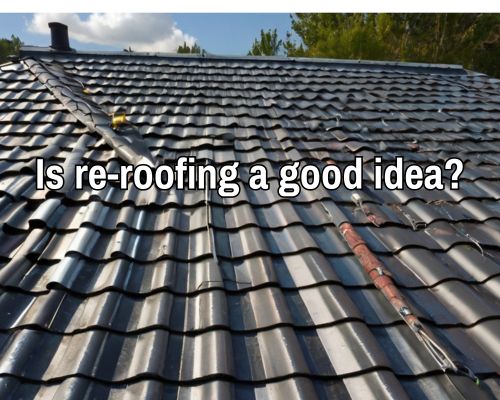Charles Jimerson of Commercial Roofing NJ has to say “If you’re a homeowner, you know that one of the most important investments you can make is in your roof. It protects your home from the elements and ensures that you and your family stay safe and dry.”
But when your roof starts to show signs of wear and tear, you may be wondering whether it’s time to replace it or if re-roofing is a good idea.
In this article, we’ll explore the pros and cons of re-roofing and help you decide if it’s the right choice for your home.

Re-roofing is a process that involves adding a new layer of shingles on top of your existing roof. It’s a popular choice for homeowners who want to save money and time on a full roof replacement.
Re-roofing can be a good idea if your roof is still in good condition, but is starting to show signs of wear and tear, such as missing or damaged shingles. However, it’s important to note that re-roofing is not always the best solution, and there are some situations where a full roof replacement is necessary.
In the next section, we’ll explore the pros and cons of re-roofing in more detail.
Assessing the Need for Re-Roofing
When it comes to assessing the need for re-roofing, there are a few key factors to consider.
Evaluating Roof Condition
The first step in determining whether re-roofing is necessary is to evaluate the condition of your roof.
Look for signs of age, rot, damage, leaks, water damage, missing shingles, and other issues that may be affecting its integrity. If you notice any of these problems, it may be time to consider re-roofing.
It’s important to keep in mind that even if your roof is relatively new, it may still need repair or replacement.
Regular roof inspections can help identify underlying issues before they become major problems. If you’re unsure about the condition of your roof, consider having a professional inspection done.
Understanding the Impact of Weather
Weather can have a significant impact on the lifespan of your roof.
If you live in an area with harsh winters, for example, you may be more likely to experience issues like ice dams, which can cause water damage and lead to the need for re-roofing.
Mold, mildew, and moss can also be a problem in humid or wet climates. Regular cleaning and maintenance can help prevent these issues from becoming serious, but if you notice significant growth or damage, re-roofing may be necessary.
Sagging is another issue that can be caused by weather or underlying issues with the roof’s structure.
If you notice any sagging or other signs of damage, have a professional inspection done to determine the cause and whether re-roofing is necessary.
Considerations for Re-Roofing
When it comes to re-roofing, there are several factors to consider before making a decision. In this section, we will discuss some of the most important considerations to help you make an informed choice.
Material Selection and Cost
The selection of roofing material is an essential factor to consider when re-roofing.
Options include asphalt shingles, metal, clay tiles, and slate. Each material has its pros and cons, and the cost varies based on the type of material you choose.
Asphalt shingles are the most popular and cost-effective roofing material, while metal roofs are more expensive but more durable and energy-efficient.
Choosing the Right Contractor
Choosing the right roofing contractor is critical to ensuring that the re-roofing process is completed efficiently and effectively.
When selecting a contractor, make sure they are licensed and insured. Check their references and reviews to ensure they have a good reputation in the industry.
A professional roofing contractor like Commercial Roofing NJ will also provide you with a detailed estimate and explain the entire re-roofing process.
Understanding the Re-Roofing Process
The re-roofing process involves stripping the old roof and inspecting the roof deck for damage. Then, a new roofing system is installed.
During the process, the contractor will remove the old shingles, underlayment, and felt paper. They will also inspect the roof deck for any significant damage and make repairs if necessary. After that, they will install the new roofing system, including the underlayment, shingles, and protective layer. The process can take several days, depending on the size of the roof and the weather conditions.
When considering re-roofing, keep in mind that building codes only allow for a total of two layers of roofing. Re-roofing can be a cost-effective solution for minor issues or when the roof is nearing the end of its lifespan. However, if the roof has significant damage, a roof replacement may be a better long-term solution.
Re-roofing can be a good option if your roof is in good shape, and you want to improve its curb appeal and energy efficiency. However, it is essential to consider the pros and cons of re-roofing and work with a licensed, professional roofing contractor to ensure the process is done safely and efficiently.

